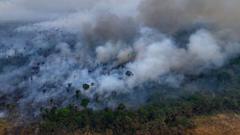Recent satellite data shows that tropical forests experienced their fastest loss ever recorded last year, with 67,000 sq km disappearing due to intensified fires, particularly in the Amazon. While Southeast Asia shows signs of progress from effective policies, the growing crisis raises fears of irreversible ecological decline.
Record Deforestation of Tropical Forests Sparks Global Alarm

Record Deforestation of Tropical Forests Sparks Global Alarm
New satellite analysis reveals a staggering loss of tropical forests in 2024, driven primarily by fires, raising concerns over the resilience of these vital ecosystems.
The world’s tropical forests, which play a crucial role in mitigating climate change, have faced unprecedented destruction, as new satellite data indicates the fastest deforestation rate on record last year. Researchers estimate that 67,000 square kilometers (26,000 square miles), an area nearly equivalent to the Republic of Ireland, were lost in 2024, translating to the alarming rate of 18 football pitches every single minute.
The leading cause of this loss was fires, surpassing agricultural land clearances for the first time documented. The Amazon rainforest, already vulnerable due to record drought conditions, suffered disproportionately. This highlights a pressing issue as scientists express concern over the potential for these forests to reach a "tipping point," marking an irreversible decline.
Professor Matthew Hansen, co-director of the GLAD laboratory at the University of Maryland, described the findings as "frightening" and noted the theory of "savannisation," wherein thriving forests could transition permanently into savanna ecosystems, becoming a more arid landscape. Recent studies underpin this warning, suggesting significant dieback in the Amazon could occur if global warming surpasses the critical threshold of 1.5°C as outlined in international climate agreements.
Historically, the Amazon has mitigated climate change by sequestering carbon dioxide (CO2), but rampant deforestation has resulted in the forest releasing vast amounts of CO2 back into the atmosphere, further exacerbating global warming. In the last year, the Amazon experienced its worst drought on record, driven by a combination of climate change effects and the natural El Niño weather pattern. Most destructive fires have been set intentionally to clear land for agriculture, compounded by drought conditions that fueled their spread in Brazil and Bolivia.
Experts believe that humanity has entered a new phase where the risks posed by fires are more significant than previous agricultural clearances. Rod Taylor, from the World Resources Institute, noted this alarming feedback loop, where fires become increasingly intense and frequent due to climate change.
In total, researchers estimate that the catastrophic loss of this primary tropical forest resulted in the emission of about 3.1 billion tonnes of planet-warming gases, roughly equivalent to the total emissions of the European Union.
Conversely, there was a silver lining in Southeast Asia, where the area of primary forest loss in Indonesia notably decreased by 11% compared to the previous year, due to government-enforced "no burning" legislation. Elizabeth Goldman, co-director of the Global Forest Watch project, emphasized the importance of political will in achieving conservation success.
While this progress is commendable, experts warn that similar initiatives in other countries, like Brazil, have faltered when political intentions changed. The importance of consistent policies in forest conservation cannot be overstated.
Looking ahead, the upcoming UN climate summit, COP30, set to take place in the Amazon, will be pivotal in sharing successful forest protection strategies. One anticipated proposal includes providing financial incentives to countries that maintain their tropical forests, an innovative approach to align economic benefits with conservation efforts.
As global leaders prepare for the summit, discussions around how to effectively reward forest preservation remain critical to combating the current deforestation crisis. The challenge remains substantial, as currently, policies often favor deforestation over conservation, necessitating urgent action to preserve these essential ecosystems.




















